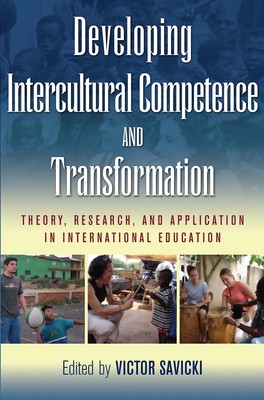
- We will send in 10–14 business days.
- Publisher: Stylus Publishing (VA)
- ISBN-10: 1579222668
- ISBN-13: 9781579222666
- Format: 15.4 x 22.5 x 2.1 cm, softcover
- Language: English
- SAVE -10% with code: EXTRA
Developing Intercultural Competence and Transformation (e-book) (used book) | bookbook.eu
Reviews
Description
"Savicki and contributors urge educators to craft international opportunites for learning based in experiential and reflective practices. Combining educational theory, program assessment, and pedagogical design, their essays serve as a guide for educators hoping to lead students toward transformation through intercultural exchange."--Diversity and Democracy
Enrollments in international education programs are projected to grow exponentially as students, parents, and university personnel seek to prepare future leaders who can live and work effectively in a global environment.
International education provides opportunities for students to grow personally, and to learn in a rich and intense educational environment. The outcomes of such opportunities emphasize not only traditional academic competence, but also changes in motivations, attitudes, self-identity, and values. It is these latter, co-academic, concepts that are the focus of this book. Its goal is to give solid substance to the growth and transformation approach to study abroad. It defines the central concept of intercultural competence, sets it within the framework of transformative learning theory, and offers ideas and strategies for facilitating its development. In doing so, it goes far beyond traditional emphases on the achievement of such formal skills as foreign language acquisition or specific knowledge of course content in national literatures, arts, or history.
EXTRA 10 % discount with code: EXTRA
The promotion ends in 16d.20:56:56
The discount code is valid when purchasing from 10 €. Discounts do not stack.
- Publisher: Stylus Publishing (VA)
- ISBN-10: 1579222668
- ISBN-13: 9781579222666
- Format: 15.4 x 22.5 x 2.1 cm, softcover
- Language: English English
"Savicki and contributors urge educators to craft international opportunites for learning based in experiential and reflective practices. Combining educational theory, program assessment, and pedagogical design, their essays serve as a guide for educators hoping to lead students toward transformation through intercultural exchange."--Diversity and Democracy
Enrollments in international education programs are projected to grow exponentially as students, parents, and university personnel seek to prepare future leaders who can live and work effectively in a global environment.
International education provides opportunities for students to grow personally, and to learn in a rich and intense educational environment. The outcomes of such opportunities emphasize not only traditional academic competence, but also changes in motivations, attitudes, self-identity, and values. It is these latter, co-academic, concepts that are the focus of this book. Its goal is to give solid substance to the growth and transformation approach to study abroad. It defines the central concept of intercultural competence, sets it within the framework of transformative learning theory, and offers ideas and strategies for facilitating its development. In doing so, it goes far beyond traditional emphases on the achievement of such formal skills as foreign language acquisition or specific knowledge of course content in national literatures, arts, or history.


Reviews